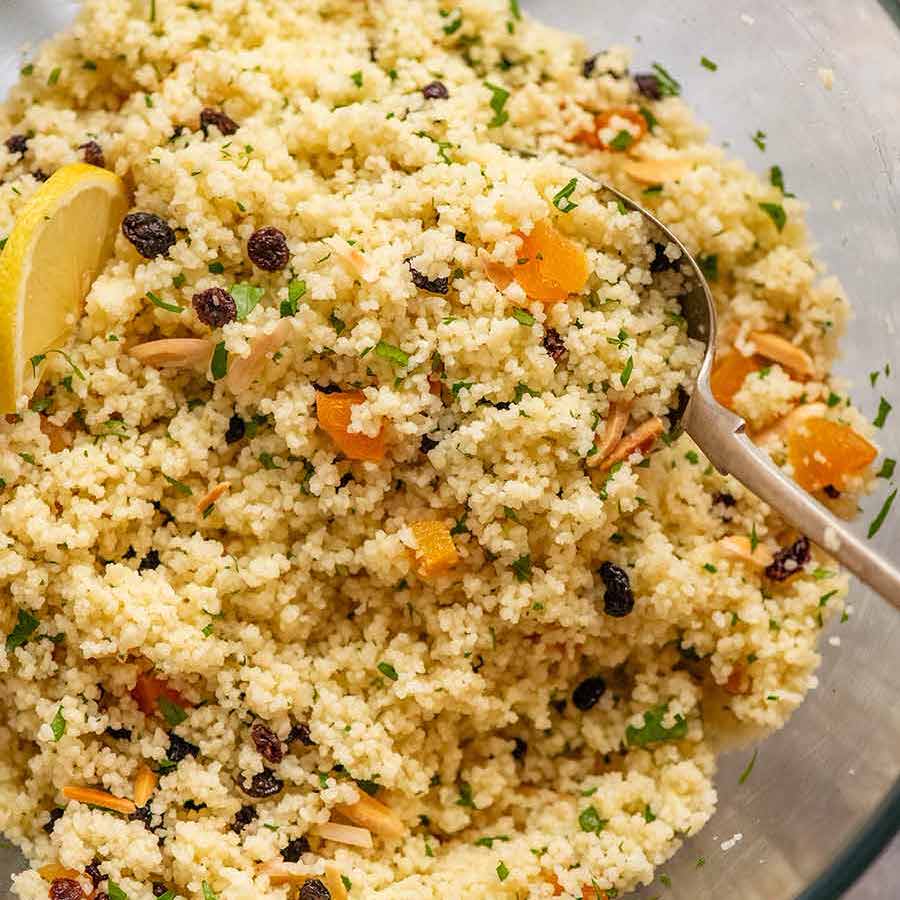Table of Contents
Here is a short summary of Couscous and if it is a gluten free diet. Without further ado, let’s get to the point.
Is couscous gluten-free?
No, couscous is not gluten-free.
Couscous is a traditional North African dish made from crushed durum wheat semolina, which contains gluten. Therefore, individuals with gluten sensitivity or celiac disease should avoid couscous and opt for gluten-free alternatives like quinoa or rice couscous. Always check product labels and packaging for gluten-free certifications to ensure safe consumption.

Learn all About Couscous
In recent years, gluten-free diets have gained popularity, and individuals with gluten sensitivity or celiac disease often seek gluten-free alternatives to their favorite foods.
One such staple that sparks curiosity is couscous gluten free. In this article, we will explore the question of whether couscous is gluten-free.
Join us as we unravel the gluten-free mystery surrounding this beloved grain-based dish.
Understanding Couscous
Couscous is a traditional North African dish made from tiny granules of durum wheat semolina. It is a versatile ingredient that can be used in a variety of recipes, such as salads, stews, and pilafs.
However, when it comes to gluten-free diets, the presence of wheat semolina in couscous raises concerns.
The Gluten-Free Dilemma
Gluten is a protein found in wheat, barley, and rye. It can trigger adverse reactions in individuals with gluten-related disorders, including celiac disease, wheat allergy, or non-celiac gluten sensitivity.
Therefore, people following a gluten-free lifestyle must be cautious about consuming foods that contain gluten.
Is Couscous Gluten Free?
The answer to the question, “Is couscous gluten free?” is no. Traditional couscous is made from wheat semolina, which contains gluten. As a result, individuals with gluten-related disorders should avoid couscous made from wheat semolina to prevent adverse reactions.
Gluten-Free Alternatives
Fortunately, several gluten-free alternatives to wheat couscous are available, allowing individuals with gluten sensitivity to enjoy similar textures and flavors. Here are some popular gluten-free couscous alternatives:
- Corn Couscous: Made from cornmeal, corn couscous offers a gluten-free option that closely resembles the texture of traditional couscous. It is a versatile choice that can be used in various recipes.
- Rice Couscous: Rice couscous is another gluten-free option that provides a delicate texture and can be used as a substitute in both savory and sweet dishes.
- Quinoa Couscous: Quinoa couscous is derived from the quinoa grain, which is naturally gluten-free. It offers a nutritious and protein-rich alternative to traditional couscous.
These gluten-free alternatives open up a world of possibilities for individuals seeking to incorporate couscous-like textures and flavors into their gluten-free diets.
Identifying Gluten-Free Couscous
When seeking is couscous gluten free alternatives, it is crucial to carefully read food labels and look for certified gluten-free products. Some manufacturers produce gluten-free couscous made from alternative grains such as corn or rice.
Look for clear labeling that indicates the product is gluten-free and has been tested to meet the required standards.
Preparing Gluten-Free Couscous
When cooking gluten-free couscous alternatives, it is essential to follow the specific instructions provided by the manufacturer. The cooking times and liquid ratios may vary compared to traditional couscous.
Additionally, it is advisable to use separate utensils and cooking equipment to prevent cross-contamination with gluten-containing products.
Experiment with different gluten-free couscous alternatives and explore their unique characteristics and cooking methods. Adjust seasonings and flavors to suit your preferences and discover new combinations that will excite your taste buds.
Enjoying Gluten-Free Couscous Dishes
With gluten-free couscous alternatives, you can recreate your favorite couscous dishes while adhering to a gluten-free lifestyle. Explore new recipes and experiment with flavors to create delicious gluten-free couscous salads, pilafs, or side dishes.
The versatility of gluten-free alternatives allows you to enjoy the textures and tastes you love, without the worry of gluten-related reactions.
Seeking Professional Advice
If you have gluten-related disorders or suspect gluten sensitivity, it is essential to consult with a healthcare professional or registered dietitian who specializes in gluten-related conditions. They can provide personalized guidance, and dietary recommendations, and help you navigate the challenges of maintaining a gluten-free lifestyle.
Conclusion
Couscous made from wheat semolina is not gluten-free, as it contains gluten, which can be problematic for individuals with gluten-related disorders. However, there are gluten-free alternatives available that offer similar textures and flavors.
By opting for certified gluten-free couscous alternatives like corn couscous, rice couscous, or quinoa couscous, individuals adhering to a gluten-free lifestyle can enjoy a variety of delicious couscous dishes without compromising their dietary needs.
Remember, when it comes to is couscous gluten free, selecting gluten-free alternatives is key. Embrace the variety of gluten-free couscous options available and savor the flavors of this beloved dish while maintaining a gluten-free lifestyle.
With a little creativity and exploration, you can enjoy couscous-like textures and flavors in your gluten-free meals, adding excitement and deliciousness to your dining experience.




